2024 was third hottest year on record for Massachusetts | WBUR


The Lab’s Managing Director Joe Christo & Research Director Paul Kirshen spoke with WBUR about NOAA’s climate assessment report for 2024.
Last year — 2024 — was the third hottest year on record for Massachusetts, according to a report released Friday by NASA and the National Oceanic and Atmospheric Administration (NOAA).
Elsewhere in New England, it was the warmest year in the 130-year historical record for New Hampshire, Maine and Vermont.
Nationwide, it was the hottest year on record for the contiguous U.S.
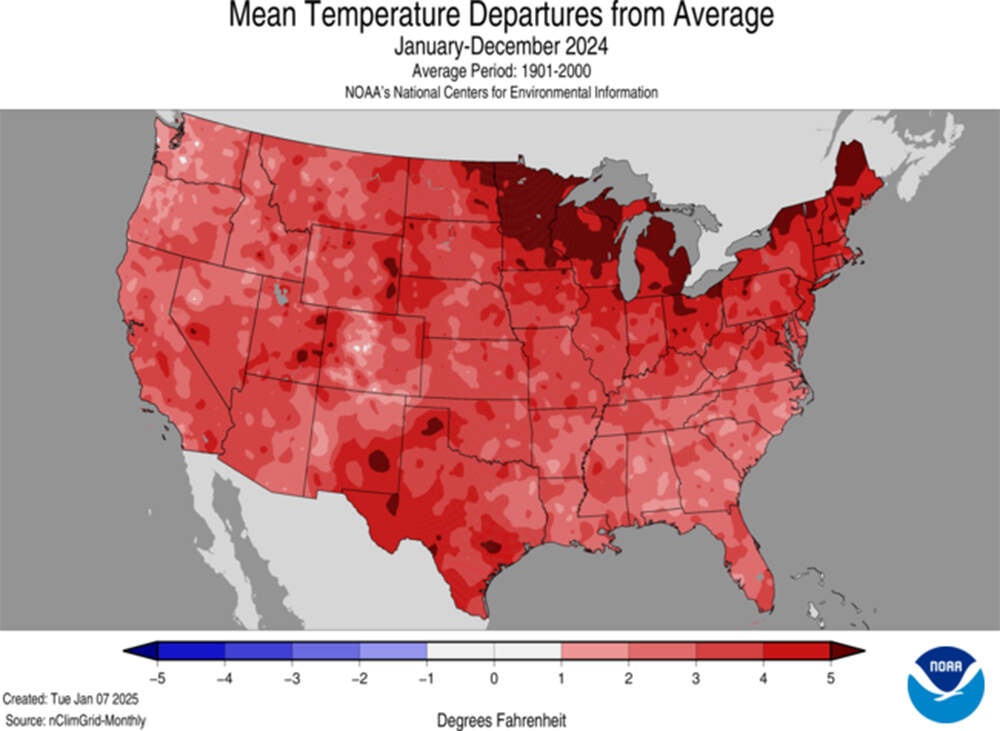
And globally, 2024 edged out 2023 by 0.1°Celsius to officially become Earth’s hottest year on record.
A handful of international scientific organizations measure global temperature with different techniques, resulting in some variance in the final measurements. However, there is general agreement that the 2024 global average temperature exceeded 1.5° Celsius above pre-industrial levels — a limit the Paris Climate Accords aimed to stay below.
WBUR is a nonprofit news organization. Our coverage relies on your financial support. If you value articles like the one you’re reading right now, give today.
Russell Vose, with NOAA’s National Centers for Environmental Information, noted that target actually refers to a multi-decade average, so the planet hasn’t technically surpassed it yet. But, he said, that’s projected to happen well before mid-century.
“The Earth continues to warm as we continue to pour greenhouse gases into the atmosphere,” said Max Holmes, president and CEO of the Woodwell Climate Research Center in Falmouth. “And we’re seeing the consequences.”
The report also noted 27 separate billion-dollar weather and climate disasters in the United States. The most significant was Hurricane Helene in September, which brought severe flooding to North Carolina and parts of Tennessee.
There were no billion-dollar weather or climate disasters in New England in 2024.
The collective costs for these disasters in 2024 was $182.7 billion, the fourth highest on record, according to NOAA. The total cost may rise by several billion as additional damages are reported. There were at least 568 fatalities associated with these events.
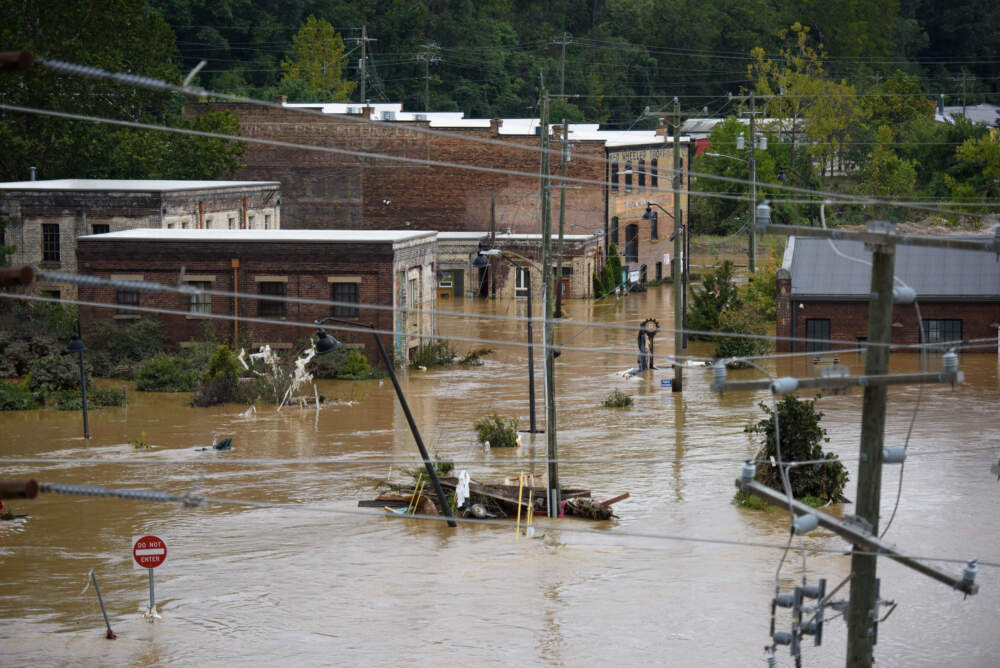
In New England, the warming continues to fuel to myriad intertwined effects, including drought, wildfire, intensifying bursts of rain, stormwater flooding, marine heat waves and changes in ocean circulation.
“We’re in this vicious cycle,” said Paul Kirshen, a professor at the School for Environment at UMass Boston. “Climate change in one sector negatively impacts another, and it’s a very difficult cycle to break.”
This year’s annual report arrives as President-elect Donald Trump prepares to take office. Trump has previously called global warming a “scam,” and said he wants to curtail government action on climate change.
“The U.S. federal government plays an incredibly important role in setting climate policy, and as a global leader in climate policy and climate action,” Holmes said. Cities, states, and other countries could fill a leadership void if necessary, he said, “as a proud American it pains me to have the prospect of the U.S. stepping back.”
Here’s a look at some local impacts of climate change in 2024:
Boston saw 12 days over 90°F degrees last summer, up from five days in 2023. Both years were lower than the 30-year average of 14 days over 90°F, according to Torry Dooley, a meteorologist with the National Weather Service.
Despite these lower-than-average numbers in recent years, the overall temperature trend is still upward, said Joe Christo, managing director at the Stone Living Lab and chief resilience officer at Boston Harbor Now.
“It is essential that the city, the state, and the region are always planning for the effects of extreme heat, as we are seeing those effects increase year after year,” Christo said.
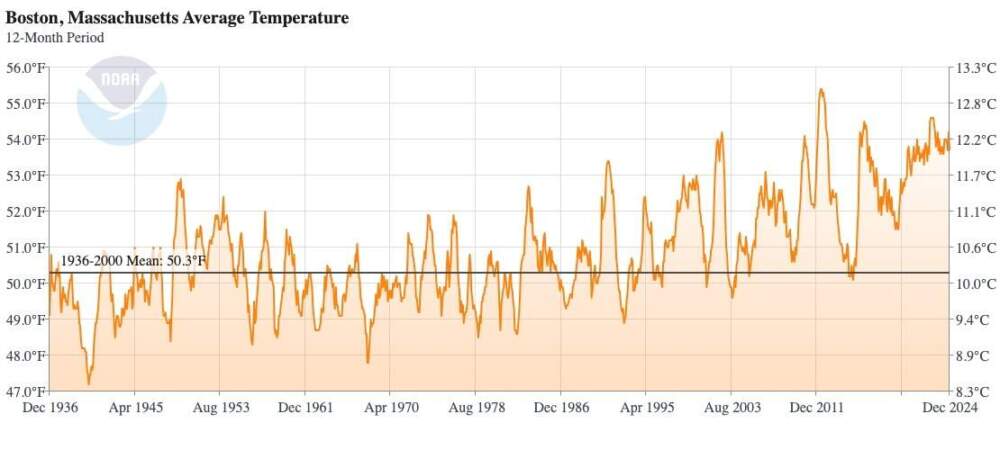
Heat is the leading weather-related cause of death in the U.S. When combined with humidity, even lower temperatures can be harmful. The “heat index” is what the temperature feels like when you combine humidity and air temperature. By mid-century, days with a heat index over 100°F are projected to increase threefold in the Northeast.
The Massachusetts Department of Public Health began tracking heat-related deaths last year and recorded two deaths in 2024 with heat as the underlying cause, and three additional deaths in which exposure to extreme heat was a secondary cause.

Massachusetts experienced significant drought in 2024, driven by lower-than-average rainfall in late summer and fall. During October, some areas recorded their lowest rainfall totals ever.
The dry conditions fueled what Massachusetts Emergency Management Director Dawn Brantley called “a historical fall fire season,” including almost 200 wildfires in October – an increase of about 1,200% over the average for that month.
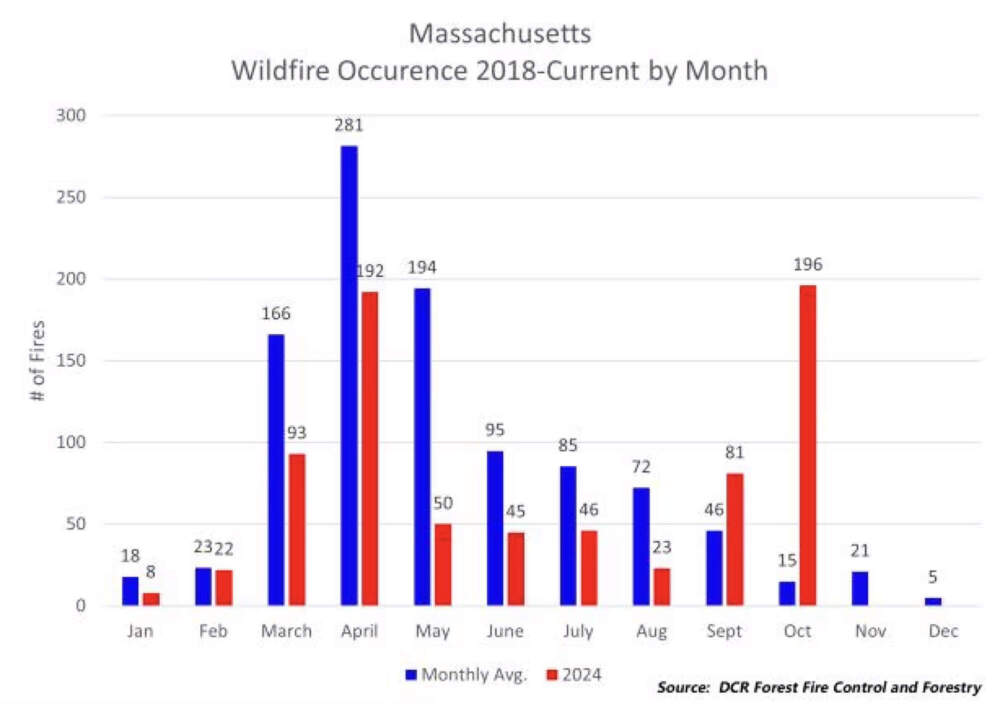
Drought conditions are improving in Massachusetts. On Wednesday, state officials downgraded “critical” regions across the state to “mild” or “significant.”
While Massachusetts saw a parched late-summer and fall, precipitation was above average for the year.
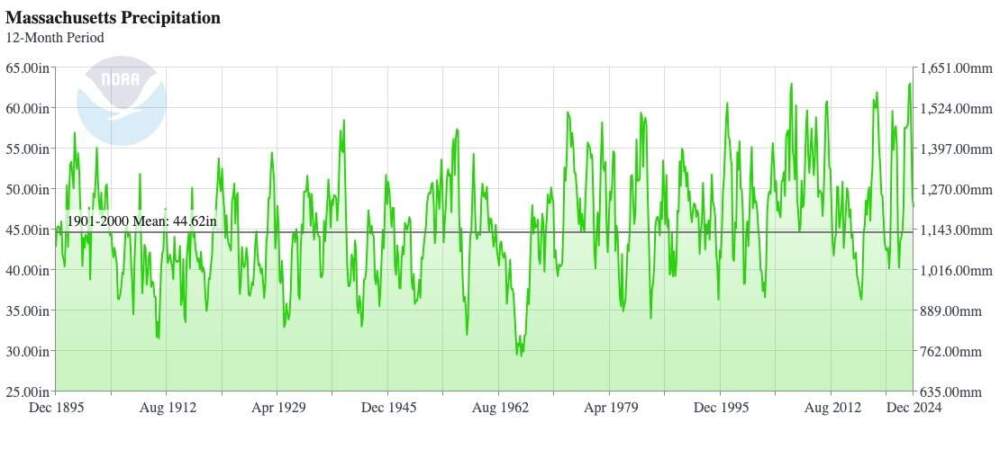
Extreme precipitation has increased by about 60% in the region in recent decades, according to the 2023 National Climate Assessment. That’s the largest increase in the U.S.
In urban areas, stormwater runoff can overwhelm sewer systems, leading to road flooding and untreated sewage in waterways.
In rural river valleys, flash flooding is increasingly common; 2024 marked the second year in a row that Vermont endured catastrophic floods.
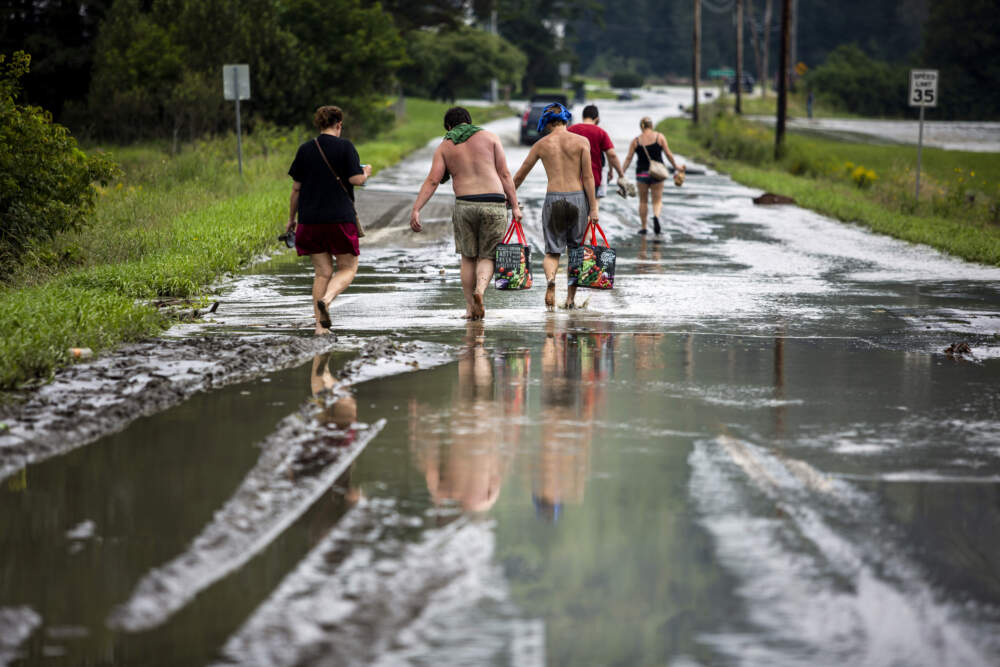
Global sea surface temperatures were at or near record highs in 2024.
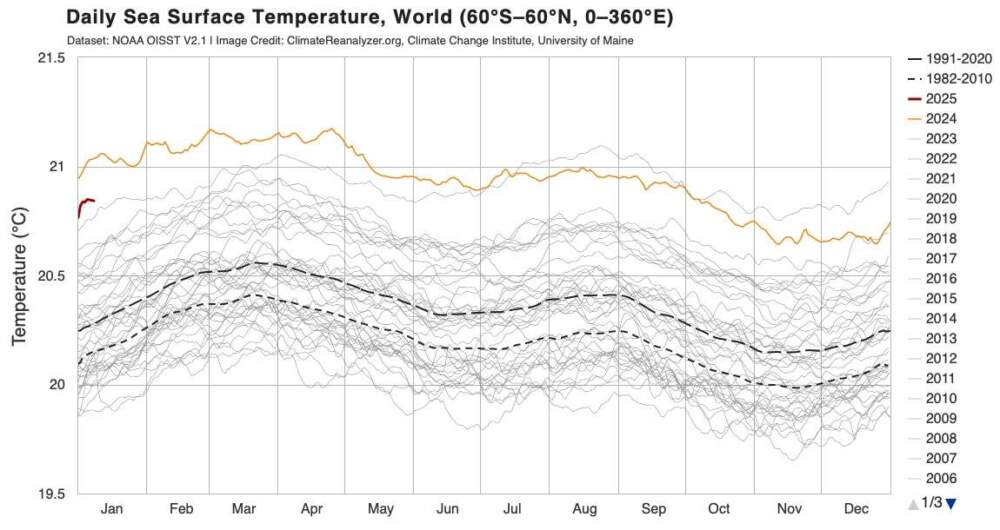
Ocean warming has led to profound changes in the waters off the coast of New England. The Gulf of Maine is warming faster than most of the world’s oceans, melting glaciers are altering ocean currents and water salinity, weather patterns are shifting, and carbon dioxide dissolving into the ocean is making the water more acidic.
These changes have altered the timing and type of fish in the region. Iconic New England species like cod and lobster have shifted north or moved to deeper ocean in search of colder water, while warm-water fish like black sea bass have moved in.
Warmer water also contributes to algal blooms and low-oxygen zones that endanger fish and public health. Ocean acidification threatens shelled sea creatures like lobsters, mussels and oysters.
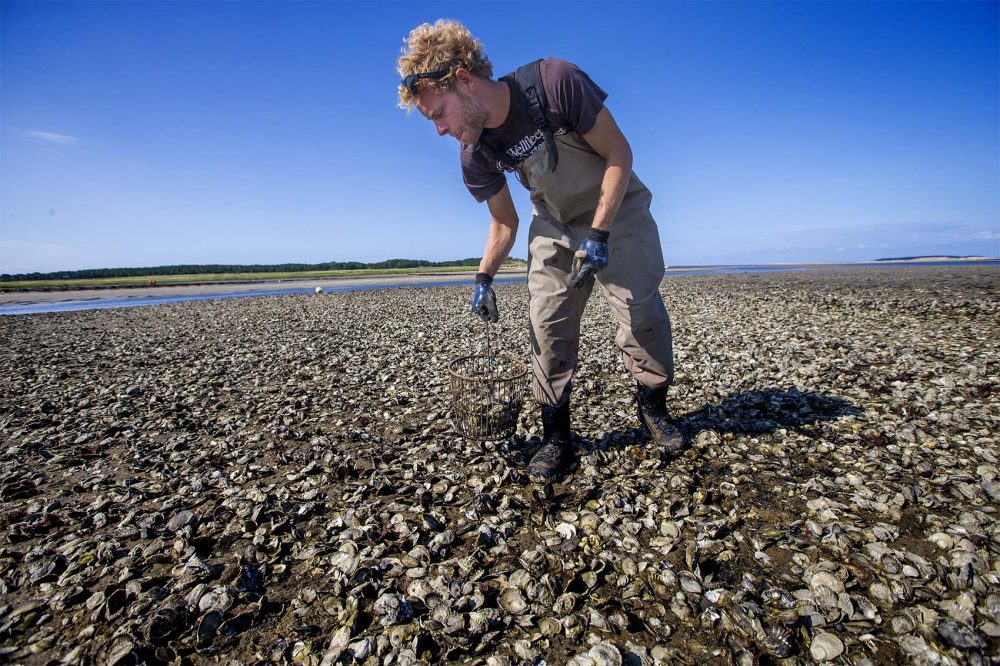
”These changes in the marine environment are so fundamental that the social and economic activities that depend upon the marine environment are going to have to change,” said Paul Kirshen, the UMass professor.
On land we can adapt to climate change by building cooling shelters and flood barriers, he said. But humans cannot alter the Gulf Stream, decrease widespread ocean acidification or lower average ocean temperatures.
“We cannot protect ourselves against these changes in the marine environment,” he said. “They’re too large-scale, they’re not well understood, and we can’t wall ourselves off from them.”
Experts say the only way to mitigate the changes is to reduce greenhouse gas emissions.
“We need to — as rapidly as possible — dramatically reduce the greenhouse gases that we’re putting into the atmosphere,” said Holmes. “That’s primarily by getting off the fossil fuels, and it’s secondarily by protecting forests and preserving land.”